Words of Wisdom - Shastra
& Shastrakaras speak
For Books and shastra downloads see Main Index, under
Books:
Om Namo Bhagavate Vasudevaya
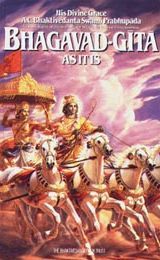

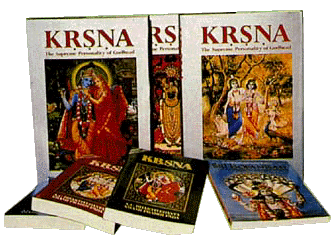
The Complete Works of Srila Prabhupada
All the books, the letters and conversations at your
fingertips


All Srila Prabhupada's books and more on one disk
http://www.vedabase.com





Srila Prabhupada's Audio lectures to listen to on-line:
http://www.hare-krishna.org/srila-prabhupada-lectures.htm
Listen to Srila A.C. Bhaktivedanta Swami Prabhupada on-line
- all 900 of his lectures are available HERE:
http://www.prabhupadavani.org/
Srimad Bhagavatam - the entire lecture series listen and
read along on-line - Narrated by Amala Bhakta dasa:
http://www.prabhupadavani.org/SB_index.html
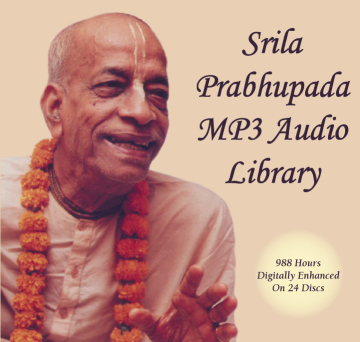
The new enhanced Prabhupada MP3 series
http://www.prabhupada.com/store/store.php?page=product.php&id=MP3AUDIOLIB








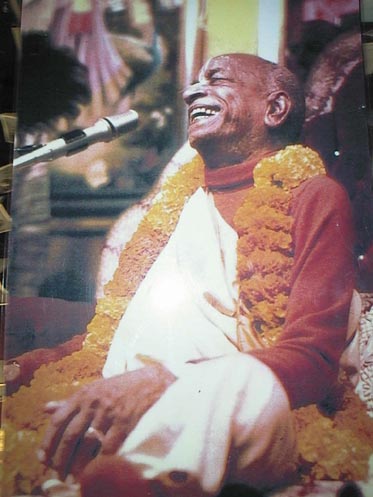
Visit "Prabhupada Connect" for all manner of Prabhupad
Nectar:
http://www.prabhupadaconnect.com/Index.html
Srila Prabhupada's Final Lesson Video - Downloadable and
viewing on-line
http://users.iskconludhiana.com/images/thumbnails.php?album=21


All Srila Prabhupada's original books
available for sale here.

Download all the Hare Krsna teachings which includes
all Vaisnava and
Vedic concepts by visiting one of the sites listed at
the following address.
http://www.geocities.com/suci123/bookdownloadsites1.html
The Bhaktivedanta Book Trust
Srila Prabhupad Memorial Library
http://www.krishna.com/main.php?id=33


33 Books Online Including Srimad Bhagavatam!
http://www.geocities.com/freeprabhupadabooks
The compressed "self extracting" file mentioned is now currently
available for download
http://www.krsnaconsciousness.org/Gauranga/Folio/BhaktivedantaVedabase_DOS.exe

Download or Listen to Prabhupad Bhajans HERE:
http://www.prabhupadavani.org/web/text/Bhajans.html


On-line 1972 McMillan edition - Bhagavad Gita As It Is:
http://www.asitis.com/

Bhagavad Gita AS IT IS on-line through the Tirupathi
Balaji site:
http://www.bhagavad-gita.us/

Bhagavad Gita Study guide on-line book:
http://chantandbehappy.com/gita/studyguide/StudyGuide-main.htm
Bhagavad Gita Study guides by numerous Iskcon devotees
- FREE downloads:
http://www.veda.harekrsna.cz/library/#3

All the Scriptures you'd ever need 4 FREE
http://www.hknet.org.nz/index-books.htm
http://www.hknet.org.nz/DDB.htm
http://www.hknet.org.nz/DDB2.html
last updated 4th August 2003


Srimad Bhagavad Gita AS
IT IS
Bhagavad Gita: Chapter
6 - Dhyana-yoga
TEXTS 13-14
samam kaya-siro-grivam
dharayann acalam sthirah
sampreksya nasikagram svam
disas canavalokayan
prasantatma vigata-bhir
brahmacari-vrate sthitah
manah samyamya mac-citto
yukta asitamat-parah
WORD FOR WORD
samam--straight; kaya--body; sirah--head; grivam--and
neck; dharayan--holding; acalam--unmoving; sthirah--still; sampreksya--looking;
nasika--of the nose; agram--at the tip; svam--own; disah--on all sides;
ca--also; anavalokayan--not looking; prasanta--unagitated; atma--mind;
vigata-bhih--devoid of fear; brahmacari-vrate--in the vow of celibacy;
sthitah--situated; manah--mind; samyamya--completely subduing; mat--upon
Me (Krsna); cittah--concentrating the mind; yuktah--the actual yogi; asita--should
sit; mat--Me; parah--the ultimate goal.
TRANSLATION
One should hold one's body, neck and head erect in a straight
line and stare steadily at the tip of the nose. Thus, with an unagitated,
subdued mind, devoid of fear, completely free from sex life, one should
meditate upon Me within the heart and make Me the ultimate goal of life.
PURPORT by HDG Srila A.C. Bhaktivedanta Swami Prabhupad:
The goal of life is to know Krsna, who is situated within
the heart of every living being as Paramatma, the four-handed Visnu form.
The yoga process is practiced in order to discover and see this localized
form of Visnu, and not for any other purpose. The localized visnu-murti
is the plenary representation of Krsna dwelling within one's heart. One
who has no program to realize this visnu-murti is uselessly engaged in
mock yoga practice and is certainly wasting his time. Krsna is the ultimate
goal of life, and the visnu-murti situated in one's heart is the object
of yoga practice. To realize this visnu-murti within the heart, one has
to observe complete abstinence from sex life; therefore one has to leave
home and live alone in a secluded place, remaining seated as mentioned
above. One cannot enjoy sex life daily at home or elsewhere and attend
a so-called yoga class and thus become a yogi. One has to practice controlling
the mind and avoiding all kinds of sense gratification, of which sex life
is the chief. In the rules of celibacy written by the great sage Yajnavalkya
it is said:
karmana manasa vaca
sarvavasthasu sarvada
sarvatra maithuna-tyago
brahmacaryam pracaksate
"The vow of brahmacarya is meant to help one completely
abstain from sex indulgence in work, words and mind--at all times, under
all circumstances, and in all places." No one can perform correct yoga
practice through sex indulgence. Brahmacarya is taught, therefore, from
childhood, when one has no knowledge of sex life. Children at the age of
five are sent to the guru-kula, or the place of the spiritual master, and
the master trains the young boys in the strict discipline of becoming brahmacaris.
Without such practice, no one can make advancement in any yoga, whether
it be dhyana, jnana or bhakti. One who, however, follows the rules and
regulations of married life, having a sexual relationship only with his
wife (and that also under regulation), is also called a brahmacari. Such
a restrained householder brahmacari may be accepted in the bhakti school,
but the jnana and dhyana schools do not even admit householder brahmacaris.
They require complete abstinence without compromise. In the bhakti school,
a householder brahmacari is allowed controlled sex life because the cult
of bhakti-yoga is so powerful that one automatically loses sexual attraction,
being engaged in the superior service of the Lord. In the Bhagavad-gita
(2.59) it is said:
visaya vinivartante
niraharasya dehinah
rasa-varjam raso 'py asya
param drstva nivartate
Whereas others are forced to restrain themselves from sense
gratification, a devotee of the Lord automatically refrains because of
superior taste. Other than the devotee, no one has any information of that
superior taste.
Vigata-bhih. One cannot be fearless unless one is fully
in Krsna consciousness. A conditioned soul is fearful due to his perverted
memory, his forgetfulness of his eternal relationship with Krsna. The Bhagavatam
(11.2.37) says, bhayam dvitiyabhinivesatah syad isad apetasya viparyayo
'smrtih. Krsna consciousness is the only basis for fearlessness. Therefore,
perfect practice is possible for a person who is Krsna conscious. And since
the ultimate goal of yoga practice is to see the Lord within, a Krsna conscious
person is already the best of all yogis. The principles of the yoga system
mentioned herein are different from those of the popular so-calledyoga
societies.
His Divine Grace A.C. Bhaktivedanta Swami Prabhupada
Copyright 1983 The Bhaktivedanta Book Trust International. Used with
permission.

Bhagavad Gita As It Is - http://www.asitis.com/
Bhaktivedanta Vedabase - Bhagavad Gita on-line http://bhagavadgitaasitis.com/
Bhaktivedanta VedaBase: Bhagavad-gita As It Is http://vedabase.net/bg/en
Bhagavad Gita Multi Media Web-version http://chantandbehappy.com/gita/
Listen to Bhagavad Gita on line - http://www.Gitamrta.org
View our Bhagavad Gita Overview:
http://www.hknet.org.nz/BG.html
Archive: http://www.cs.rice.edu/~vivek/btg/archive/
Home Page: http://www.cs.rice.edu/~vivek/btg/
Join Bhagavad Gita eGroups HERE
mailto:bhagavad_gita-owner@egroups.com


Prabhupada Uvacha:
(here's some nectar, sometimes it comes in the form of Srutakirti prabhu's
diary, other times from Govinda dasi's diary, Hari Sauri prabhu's Transcendental
Diary, Bhurijan prabhu's book, or sometimes from a letter, or other related
source, but still nectar...)
On Srila Prabhupada's Coming to the West
So it's 1966, and this old Bengali sadhu, Abhaya
Caranaravinda Bhaktivedanta Swami, walks among the jaded, faded, hair-down,
mind-gone, wild beat generation on the streets of New York's Lower East
Side. Prabhupada went among the fuzz-heads, freaks, and hippies -- refugees
from a godless, greed-torn civilization -- and presented the Absolute Truth,
the Personality of Godhead. His contemporaries in Vrndavana and the staid,
righteous sannyasis of the Gaudiya Matha would have been shocked. They
would have had nothing to do with these dirty irreverent mlecchas, that's
for sure! But here he is, Bhaktivedanta Swami down among the hippies, picking
up gold from a filthy place, confident with his ching-ching-ching and Hare
Krsna, giving the change-all be-differents a revolution that even they
could never have imagined.
None of his Godbrothers could have tolerated the
hardships which Srila Prabhupada underwent. He so tolerantly lived with
and even served the Western mlecchas, who out of ignorance constantly did
things guaranteed to disturb any cultured Vaisnava. Devoid of refinement
or any idea of Krsna consciousness other than the rudiments which they
were gradually learning by Srila Prabhupada's so patiently teaching them,
they nevertheless had faith in him. And Prabhupada had faith in the process
of Krsna consciousness -- dina-hina jata chilo, hari-name uddharilo: "even
the most fallen will be saved by the holy name" -- therefore he tolerated
their uncouth behavior. He did not see American mlecchas; he saw jivas,
servants of Krsna. He did not reject his followers for weakness or foolishness
born of immaturity. Prabhupada demonstrated the efficacy of bhakti-yoga
in circumstances more adverse than any previous preachers of bhakti had
ever faced. He had patience, extreme tolerance born of deep compassion
for the fallen souls, and faith in the power of the holy name.
Srila Prabhupada found something vital and real
amidst the madness of hippie life. Permeating the confusion was a spiritual
search, a dissatisfaction with the status quo, an endeavor for the mystical,
for the truth beyond the humdrum. The hippies had been through it all --
drugs, booze, free sex, music, and "meditation." But Krsna consciousness
was something else, brought by a person who seemed as if from another planet,
from an unimagined plane of existence that revealed their attempts at consciousness
expansion to be puerile and insignificant.
Like most other people the hippies were not intrinsically
bad, just misguided. They had seen through the nastiness of "straight"
life and were looking for something better. Lacking proper guidance they
had turned down the blind alley of gross sense gratification. But for all
the newness and euphoria of their crazy life, it was just as unfulfilling
as the establishment they had already rejected. Swamiji, however, had something
genuine. And he surely was not a "straight." The hippies thrived on being
different, but Prabhupada outdid them all. He had sharing, simplicity,
color, joy, and love, all essential elements of the hippie counterculture,
but he also brought substance, direction, knowledge, and purity. He had
Krsna.
And he had music.
Prabhupada was all about music: kirtana. Music
was the sacred beginning, middle, and end of hippie life. From the internationally
famous bands to the streetside guitarists, music was an expression of being,
of struggle, of lust, frustration, pain, hope, and longing. Music was both
a message and a question, a quest for understanding and a plea to be understood.
Swamiji's music was new. No one had ever played
stuff like that! Every note, every word, was magical -- an intense mystical
outpouring of the vital inner self.
"Man, is this hip!"
Hare Krsna, Hare Krsna, Krsna Krsna, Hare Hare/
Hare Rama, Hare Rama, Rama Rama, Hare Hare. Simple rhythm, simple tune.
Again and again, over and over. Half an hour. . . One hour . . . More .
. . Swami step. Trance dance. "This transcendental sound vibration is imported
from the spiritual world."
"Far out! What does it do to you?"
"Sometimes the devotees faint, sometimes they
roll on the ground, and sometimes they shiver in ecstasy while chanting
the holy names. Chanting and chanting, they give up their material bodies
and go to the spiritual land of Vraja, where talking is singing, walking
is dancing, and everyone's heart is stolen by a beautiful blackish cowherd
boy. Glancing mischievously at the gopis, He fills up the holes of His
flute with nectarean sounds that stun all living beings within the three
worlds."
Through music and diligent concern, Srila Prabhupada
did what everyone else had given up on: he reached the hearts of the hippies
and gave them direction. Prabhupada was serious, and the more intelligent
amongst the hippies gradually realized that he wanted them to follow him
and also become serious about Krsna consciousness. Still, no one had any
idea as to exactly how serious Prabhupada really was. No one understood
why he incorporated the International Society for Krishna Consciousness.
What was all that about, when Krsna consciousness was just a rented storefront
on the Lower East Side?
Brahmananda and company were shocked when Srila
Prabhupada left for San Francisco, but Prabhupada had big plans. His magic
worked again in San Francisco, and gradually it started working all over
the world. Prabhupada spread his charm by sending his disciples here and
there. They were young boys and girls, dropped out from everything, saved
by Prabhupada from voluntary drug-induced brain destruction. They didn't
know much about Krsna consciousness, or about anything. But now they were
different -- no longer hippies but "happies."
Srila Prabhupada had inspired a faith in them
that made the Krsna magic work even without his personal presence. And
by that faith, his disciples brought guru and Krsna with them. Prabhupada
was proud of his householder disciples who succeeded in London, where his
sannyasi Godbrothers had failed. Indeed these householders, fresh out of
hippie life, with no background of Indian cultural life, and who were certainly
not learned Vedic scholars, had "startled" London with the Krsna chant.
And so the story unfolded. Srila Prabhupada strode
across the globe and like a great general sent men here and there to spread
the Krsna message. It is a great story whose chapters are still being written.
And in the future, people will look back on these formative years of ISKCON
and think, "Oh, how I wish I could have been there then. How exciting it
must have been!"
All of Prabhupada's activities were amazing, yet
those first days in America held a special sweetness and significance.
None of us knows how intense was the struggle nor how severe were the difficulties
that Srila Prabhupada underwent for establishing the Krsna consciousness
movement in the West. But Prabhupada knows, his guru-maharaja knows, and
Krsna knows.
Let us all remember Srila Prabhupada's pastimes
and thus become purified and happy.
I especially pray that Prabhupada's lila of coming
to the West be ever manifest in my heart. Let me remember his sacrifice
so that I may not become selfish. Let me remember his tolerance that I
may become tolerant.
All glories to Srila Prabhupada's coming to the
West!
All glories to your divine lotus feet, Srila Prabhupada!
Please keep a place for me there always.
*****
Prajapati: Srila Prabhupada, why has it taken
so long for a pure devotee to come to the West? Has the West been so sinful
that no pure devotee has come before Your Divine Grace?
Srila Prabhupada: (laughs) Don't be sorry. At
that time you were so sinful that you could not receive a pure devotee.
(Conversation, 7 December 1973)
*****
Girl: Srila Prabhupada, would you please explain
why Krsna consciousness hadn't come to the West until now, why it hasn't
come earlier?
Srila Prabhupada: Because you were not born. After
your birth we have come here to take you back home, back to Godhead. Now
you take the opportunity; come with us. We were waiting for your birth.
(Lecture, 24 April 1976)
*****
Why did Srila Prabhupada come to the West?
It is my duty. My spiritual master ordered me.
(Lecture, 4 March 1966)
*****
Summer of 1986. I was alone, a tiny soul in saffron
cloth, in the grimy streets of central London. Suddenly I thought, "What
if I had to come here by myself? What if there were no temple, no devotees,
and no worldwide movement? What if I were the only one who knew about Krsna
and I had to preach single-handedly? Could I do anything?" I pondered the
possibility for a second before being slammed with reality: "No!"
I continued to walk the cold, uncaring streets,
my heart marveling in newfound appreciation of Srila Prabhupada.
- From the "Jaya Srila Prabhupada!" by HH Bhakti
Vikasa Swami
To receive little snippets of nectar like this on a daily basis subscribe
HERE: or If you want to introduce anyone else in reading Srila Prabhupada
Nectars, please send their eMail addresses to mailto:krpamaya_gauranga@hotmail.com
Please Chant:
 Hare
Krishna Hare Krishna Krishna Krishna Hare Hare
Hare
Krishna Hare Krishna Krishna Krishna Hare Hare
 Hare
Rama Hare Rama Rama Rama Hare Hare
Hare
Rama Hare Rama Rama Rama Hare Hare
...................and be Happy

Listen to Srila Prabhupad on-line
....a different lecture, morning walk, conversation or
class daily.
"The Social Body Needs A Brain"
>>> Ref. VedaBase => Bhagavad-gita 4.13 -- New York, April 8, 1973
Listen to the entire lecture on-line:
http://prabhupadaradio.com/M3U/Gita/m3u/GT153-a.m3u
Prabhupada:
catur varnyam maya srstam
guna-karma-vibhagasah
tasya kartaram api mam
vidhy akartaram avyayam
[Bg. 4.13]
This is a verse from Bhagavad-gita. Most of you know this
book, Bhagavad-gita. It is very famous book of knowledge. And we are presenting
Bhagavad-gita as it is. This Krsna consciousness movement means to present
Bhagavad-gita as it is, without any adulteration.
So Krsna says four classes of men, catur varnyam... Catur
means "four", and varna means "division of society". Just like varna means
color. As there are division of color, red, blue and yellow, similarly
human being, human society should be divided according to the quality.
The quality's also called color. Catur varnyam maya srstam guna-karma-vibhagasah
[Bg. 4.13]. So there are three qualities in this material world. Three
qualities. Or three colors. Red, blue and yellow. You mix it. Then you
become eighty-one colors. Three colors, three upon three, multiplied, it
becomes nine. Nine upon nine, multiplied, it becomes eighty-one. So there
are eight million four hundred thousands different forms of living entities.
Due to this mixture of different qualities. Nature is manufacturing different
types of body according to the association of the living entity to the
particular type of quality.
Living entities are part and parcel of God. Suppose God
is the big fire and living entities are just like sparks. The sparks, they
are also fire. Sparks also, if one spark falls on your body, on your garment,
it burns. But it is not as powerful as the big fire. Similarly, God is
all powerful. God is great. We are part and parcel of God. Therefore, our
greatness is very, very small, infinitesimal. God is great. Therefore,
He has created so many universes. We cannot account for even one universe.
This one universe which we see, the sky, the dome, within that sky, outer
space, there are millions and trillions of stars, planets. They're floating.
Floating in the air. Everyone knows.
We can float one sputnik in the sky, and we take so much
credit that we have become very, very great scientists. We don't care for
God. This is foolishness. Foolish person will say like that. But one who
is intelligent, he knows that God is floating millions and trillions of
planets in the sky, and what we have done in that comparison? This is intelligence.
So we have become very much proud of our scientific knowledge, and therefore,
at the present moment, we defy the existence of God. Sometimes we say that
"I have become God now." These are foolish statements.
You are nothing in comparison to the intelligence... He's
also intelligent. Because we are part and parcel of God, therefore we can
study what is God if we simply study ourself. Just like if you study a
drop of sea water, if you analyze chemically, you'll find so many chemicals
in that drop. So you can understand what is the composition of the sea.
The same composition. But in greater quantity. That is the difference between
God and ourself. We are small gods, we can say, small gods. Teeny, sample
gods. Therefore, we are so much proud. But we should not be proud because
we should know that all our qualities are taken from God. Because we are
part and parcel. So originally all these qualities are there in God.
And therefore Vedanta-sutra says what is God, what is
the Absolute Truth? Athatho brahma-jijnasa. When [we] inquire about God,
about the Absolute Truth, the answer is immediately given: janmady asya
yatah [SB 1.1.1]. The Absolute Truth is that from whom everything comes,
everything emanates. So everything is coming from God. He's the original
source of all supplies. Now what is our position? There are innumerable
living entities. Nityo nityanam cetanas cetananam (Katha Upanisad 2.2.13).
That is Vedic information. God is also a living entity, like us, but He's
the chief living entity. And we are also living entity.
Just like one father. Father may have got twenty children.
Twenty sons. Formerly, they used to have one hundred sons. Now the fathers
have no such power. But in the, up to five thousand years ago, King Dhrtarastra
gave birth to one hundred sons. Now we are... We say, we are saying that
we are overpopulated. But that's not the fact. At the present moment, where
there is the question of overpopulation? Now how many of us giving birth
hundreds of children? No. Nobody. But formerly, a father could give birth
to one hundred children. So there is no question of overpopulation. And
even there is overpopulation, we get information from the Vedas: eko bahunam
yo vidadhati kaman. That one chief living entity, God, He can maintain
innumerable living entities.
continued.......................
Listen to the entire lecture on-line:
http://prabhupadaradio.com/M3U/Gita/m3u/GT153-a.m3u
or receive in mailbox and Subscribe HERE:
mailto:lectures-subscribe@prabhupadavani.org
Sravanam kirtanam at:
http://www.PrabhupadaVani.org
© 2001 The Bhaktivedanta Book Trust International. Used with permission.


SRILA PRABHUPADA'S QUOTE OF THE DAY
If he reads one sloka, his life will be successful.
If one sloka, one word. This is such nice things.
Therefore we are stressing so much, "Please
distribute book, distribute book, distribute
book.”
Sign-up to receive these quote HERE:
mailto:haribol@pacific.net.sg

Bhaktivedanta Vedabase Network ...
http://vedabase.net/


The Scientific - Mathematical
Proof for God's existence:
http://geocities.com/sector114
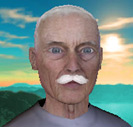
http://robot-hosting.com/php/login_nicholas.html
user name = guest
password = guest
(Collection of philosophical and mathematical proofs
for existence of God can be found in this site.)

Scientifically Philosophical Books for the layman
 ...
...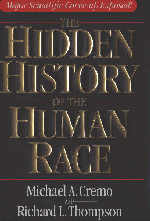 ...
...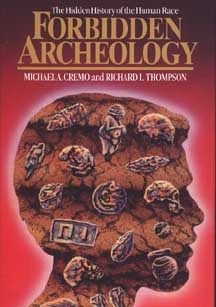 ...
...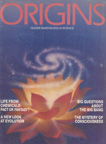
Click on any of these books to read more about them and where to get
a copy
or contact your local temple for purchases
sample of Life
comes from Life HERE.pdf

Lotus Imprints - Preserving Prabhupada's Legacy - The
Publishing House of Hari Sauri dasa
http://www.lotusimprints.com/

Quotes from Shastra - scriptures
View using Balaram font
“Real and Apparent”
by Srila Bhaktisiddhanta Sarasvati Thakura
The Voice of the Soul
http://www.sivaramaswami.com/?p=542
December 14th, 2006 Magyar editor
The awakened soul says in effect to the mind and body, ‘I am not identical
with you. I do not want what you require. I have so long believed that
I was identical with yourselves and that our interests were the same. But
I now find that I am really and categorically different from you. I am
made wholly of the principle of self-consciousness while both of you are
made of dead matter. Being matter you can act and be acted upon by matter
under the Laws of Nature. Nature makes and unmakes you, but she has no
power over me. I am not benefitted by your growth or harmed by your decay.
You grow and decay by the laws that govern your relationships with this
physical universe. Falsely identifying myself with you, I find myself compelled
to suffer pain and pleasure due to physical vicissitudes that overtake
you. I find myself unnaturally yoked to your functions such as eating,
drinking, producing thought etc. etc. and am forced to believe them to
be my own functions by which I am benefitted. I shall of course have to
stay with you as long as it is intended by Providence that I should suffer
the consequences of this unnatural alliance with you. I shall permit you
to do only what I consider to be necessary for my well-being viz. getting
back into my natural position of free conscious existence unhampered by
the unnatural domination by longing for material enjoyment. I refuse to
be any more a slave of the sensuous inclinations of the mind and body.’

The following Sections are from Sri Gaudiya Kantahara
ÄÇRÄMA-DHARMA-TATTVA
Every Soul is in One of the Four
Açrämas
15.1
sa hoväca yäjïavalkyo
brahmacaryaà
isamäpya gåhé
bhavet gåhé bhütvä vané bhavet.
vané bhutvä pravrajet.
yadi' vetarathä brahmacaryädeva
pravrajed-gåhäd vävanäd vä.
atha punara vraté vä
vrat väsnätako vä snätako vä utsannägnir
anagniko vä yadahareva virajet tadahareva pravrajet
[Janaka, the sage amongst kings,
asked Yäjïavalkya, the sage among åñés, "O
great souled sage, please instruct me on the qualifications of sannyäsa
and the rules and regulations for following that äçrama]. Yäjïavalkya
said, "Upon completing one's life as a brahmacäré, one should
accept the gëhastha-äçrama. Having completed one's life
as a gëhastha, one should accept the äçrama of vänaprastha.
After living for some time as a detached vänaprastha, one should accept
the sannyäsa äçrama.
Of course, if renunciation
awakens in a person earlier in his life, he may take sannyäsa directly
from the brahmacäré äçrama, or even from the gëhastha
äçrama, without having to first pass though all the äçramas
and become a vänaprastha. In any äçrama, when one becomes
anxious to renounce material enjoyment and render exclusive service to
the Lord in divine love, then whether he has completed the religious practices
that should be performed in the äçrama or not, whether he has
completed his Vedic study or not, whether he has completed the studies
or not, and whether he has performed the fire sacrifice or not as soon
as that powerful tendency to renounce material enjoyment and serve the
Lord awakens in his heart that very day let him give up his family, that
very day let him accept the life of a wandering mendicant and go away as
a sannyäsé. (Jäbälopaniñad 4.1)
Definition of the Four Açrämas
15.2
gåhäçramo jaghanato
brahmacaryaà hådo mama
vakñaù-sthaläd
vane-väsaù sannyäsaù çirasi sthitaù
Out of My universal form the
gëhastha äçrama originated from the loins, brahmacàrya
from the heart, vänaprastha from the chest, and sannyäsa from
the head. (Bhäg. 11.17.14)
Rules for the Different Açramas
15.3
sävitraà präjäpatyaà
ca brähmaà cätha båhat tathä
värtä saïcaya-çäléna-çiloïcha
iti vai gåhe
Then the thread ceremony for
the twice-born was inaugurated as were the rules to be followed for at
least one year after acceptance and study of the Vedas, including rules
for observing brahmacàrya, vocations in terms of Vedic injunctions,
various professional duties in household life, and the method of maintaining
a livelihood by picking up rejected grains left behind in the fields. (Bhäg.
3.12.42)
15.4
vaikhänasä välakhilyau-dumbaräù
phenapä vane
nyäse kuöécakaù
pürvaà bahvodo haàsa-niñkriyau
The four divisions of vänaprastha,
or retired life, are the vaikänasàs (those who retire from
active life and live on half-boiled meals), välakhilyas (those who
quit their former stock of grains upon receipt of more), audumbara (those
who live on what they get from the direction towards which they start after
rising from bed), and phenapas (those who live on fruits that fall from
the trees). The four divisions of sannyäsa, or the renounced order
of life are kuöécakas (one who has just left the family, but
who lives nearby in a kuöira or hut, without attachment to his family),
bahvodas (those who give up all material activities and engage in transcendental
service), haàsas (swanlike souls) and niïriyas (those whose
actions are completely spiritual). (Bhäg. 3.12.43)
Rules for Brahmacäris
15.5
dvitéyaà präpyänupürvyäj
janmopanayanaà dvijaù
vasan guru-kule dänto brahmädhéyéta
cähütaù
Having undergone all the necessary
purificatory rites since conception, and having attained the status of
the twice-born by initiation in the gäyatré mantra and investment
with the sacred thread, brähmaëa boy should reside in the gurukula
(as a brahmacàri), control his senses and mind, and carefully study
the Vedas as explained by the guru. (Bhäg. 11.17.22)
15.6
äcäryaà mäà
vijänéyän nävamanyeta karhicit
na martya-buddhyäsüyeta
sarva-deva-mayo guruù
[Kåñëa said]
The äcärya is My very Self. One should never envy the äcärya
or never blaspheme him or consider him an ordinary man, for he is the sum
total of the demigods. (Bhäg. 11.17.27)
15.7
säyaà prätar upänéya
bhaikñyaà tasmai nivedayet
yac cänyad apy anujïätam
upayuïjéta saàyataù
In the morning and evening
one should collect foodstuffs and other articles and deliver them to the
spiritual master. Then, being self-controlled, one should accept only what
the äcärya permits. (Bhäg. 11.17.28)
15.8
çuçrüñamäëa
äcäryaà sadopäséta néca-vat
yäna-çayyäsana-sthänair
näti-düre kåtäïjaliù
The brahmacäré,
should always serve the äcärya and follow him in walking, in
resting, standing by with folded hands when he sits, and by attending him
humbly in all circumstances. (Bhäg. 11.17.29)
15.9
evaà-våtto guru-kule
vased bhoga-vivarjitaù
vidyä samäpyate yävad
bibhrad vratam akhaëòitam
Behaving in this way, and strictly
following a vow of celibacy, the brahmacäré should avoid sensual
pleasures and reside in the äçrama of the äcärya
to the end of his studies. (Bhäg. 11.17.30)
15.10
evaà båhad-vrata-dharo
brähmaëo 'gnir iva jvalan
mad-bhaktas tévra-tapasä
dagdha-karmäçayo 'malaù
Observing the principles, such
a brähmaëa and life-long brahmacäré, who is My devotee,
burns all the seeds of karma to ashes by his devotional austerity. Spotless
and pure, free of material contamination, such a devotee brahmacäré
is as brilliant as fire. (Bhäg. 11.17.36)
All Açramas are Meant for
Serving Hari
15.11
brahmacaryaà tapaù
çaucaà santoño bhüta-sauhådam
gåhasthasyäpy åtau
gantuù sarveñäà mad-upäsanam
Chastity, penance, purity,
peacefulness, and kindness to all living beings constitute gëhastha-dharma.
A gëhastha who approaches his wife for procreating children only on
those days sanctioned by scripture is considered chaste. Worship of Hari
should be practiced by everyone, regardless of their position in society;
it is the duty of all varëas and äçramas. (Bhäg.
11.18.43)
Scriptures Make Concessions for Materialistic
People
15.12
loke vyaväyämiña-madya-sevä
nityä hi jantor na hi tatra codanä
vyavasthitis teñu viväha-yajïa-surä-grahair
äsu nivåttir iñöä
Everyone is naturally inclined
to have sex, eat meat, and drink wine. There is no need for the scripture
to encourage these things. The scriptures do, however, give concessions
to people who are determined to do these things. They grant license to
enjoy sex by allowing sexual intercourse with one's lawfully wedded wife
at the proper time of the month. They grant a license to eat meat to those
who perform a certain kind of sacrifice, and a license to drink wine to
those who perform the Sautramaåi sacrifice. The purpose of granting
these licenses for sense gratification is only to restrict these activities
and encourage people to give them up altogether. The real intention of
the Vedic injunctions regarding sex, meat-eating, and wine-drinking is
to make one abstain from these activities. (Bhäg. 11.5.11)
Gåhasthas Should Not Get Bewildered
by Family Life
15.13
kuöumbeñu na sajjeta
na pramädyet kuöumby api
vipaçcin naçvaraà
paçyed adåñöam api dåñöa-vat
One should not become attached
to one's family members, nor should one become bewildered trying to maintain
them. Even though one may be a householder, he should not be negligent
in his devotion to the Lord. An intelligent householder should realize
that even the unseen enjoyments promised in the future, are as temporary
as the so-called pleasures he has already seen. (Bhäg. 11.17.52)
15.14
putra-däräpta-bandhünäà
saìgamaù päntha-saìgamaù
anu-dehaà viyanty ete svapno
nidränugo yathä
Relationships of wife, sons,
relatives, and friends are like the relationships of pilgrims who meet
by chance at a resting place for a few hours before going on their way.
When one leaves his body to accept another body, such friends and relatives
are forgotten, just as upon waking one forgets the characters in a dream.
(Bhäg. 11.17.53)
15.15
itthaà parimåçan
mukto gåheñv atithi-vad vasan
na gåhair anubadhyeta nirmamo
nirahaokåtaù
Having realized the truth of
such transitory relationships, the gëhastha lives in his house like
a pilgrim, a guest, or a stranger in a strange land. Dedicating himself
entirely to Kåñëa and giving up attachment to his body,
his relatives, his house and home, he is liberated even in this lifetime.
(Bhäg. 11.17.54)
A Gåhastha May Live at Home,
in the Forest, or on the Road
15.16
karmabhir gåha-medhéyair
iñövä mäm eva bhaktimän
tiñöhed vanaà
vopaviçet prajävän vä parivrajet
Having satisfied Me by executing
his family duties properly while dedicating himself to Me, My devotee may
continue to remain at home, he may go to the forest as a vänaprastha,
or if he has a son, he may take to wandering about as a sannyäsé.
(Bhäg. 11.17.55)
The Character of Those too Attached
to Family Life
15.17
yas tv äsakta-matir gehe putra-vittaiñaëäturaù
straiëaù kåpaëa-dhér
müòho mamäham iti badhyate
On the other hand, a gëhastha
whose heart is attached to hearth and home, who is always worried about
money and children, and who is obsessed with sex, is a fool. Such a person
is bound by the misconceptions of "I and mine." (Bhäg. 11.17.56)
The Destination of Attached Householders
15.18
aho me pitarau våddhau bhäryä
bälätmajätmajäù
anäthä mäm åte
dénäù kathaà jévanti duùkhitäù
evaà gåhäçayäkñipta-hådayo
müòha-dhér ayam
atåptas tän anudhyäyan
måto 'ndhaà viçate tamaù
[At the time of death such
a fool thinks] "Alas! My mother and father have reached old age. In my
absence who will care for them? My wife and children are helpless without
me. How can any of these poor souls survive without me?" With his heart
thus overwhelmed by family sentiment, and filled with anxieties because
of attachment to house and home, such a fool, filled with worries, dies
unhappy and dissatisfied with his inability to realize his plans. He enters
the blinding darkness of hell. (Bhäg. 11.17.57-58)
taken from Gaudiya Kantahara Fifteenth Jewel Varnasharamdharma-tattwa

All pictures from Srimad Bhagavatam and Iskcon works - Copyright ©2005
The Bhaktivedanta Book Trust
International, on the web at .http://www.krishna.com/.
Used with permission.









![]()
![]()
![]()

![]()
![]()
![]()
![]()

![]()
![]()
![]()
![]()















